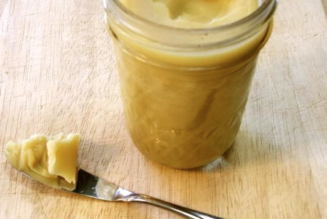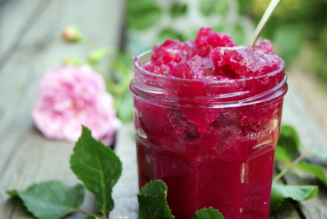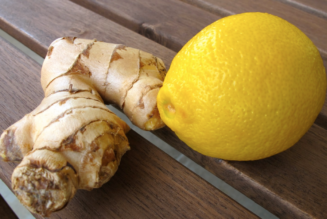Disclaimer:
All content included on this website (including, but not limited to, images, photos, graphics and text) is the property of ‘Healthy Ayurveda’ and ‘Vedic Sage’ and as such is protected by US and international copyright and other intellectual property laws.
Important: Seasons vary according to region.
This is intended to be a guide for the Northern Hemisphere [i.e. U.S.A]
Healthy living is centered around creating a daily routine and a healthy routine helps to establish balance in our lives. In order to determine an appropriate routine, we first need to understand the significance of each season. The wisdom of Ayurveda, stresses great importance on the transition between two seasons. One can think of this transition as a door from one season to the next. As we pass through this transition, we should consider a new lifestyle and new attitude as we pass from the old season and enter into a new season.
Spring Season
Spring is a time of new beginnings. This is a time when nature, once again, comes to life as flowers bloom, birds sing and people generally feel more energized. Often the first signs of spring, especially after a long cold winter, are described as God himself breathing new fresh life into his creation. In fact, Lord Krishna [in the Bhagavad Gita] explains when describing himself, “I am the Soul in the body, the mind in the senses, the eagle amongst birds and the lion amongst animals. Among all the trees I am the sacred bodhi tree, and of the season, I am spring.” More simply, spring is the king of all seasons.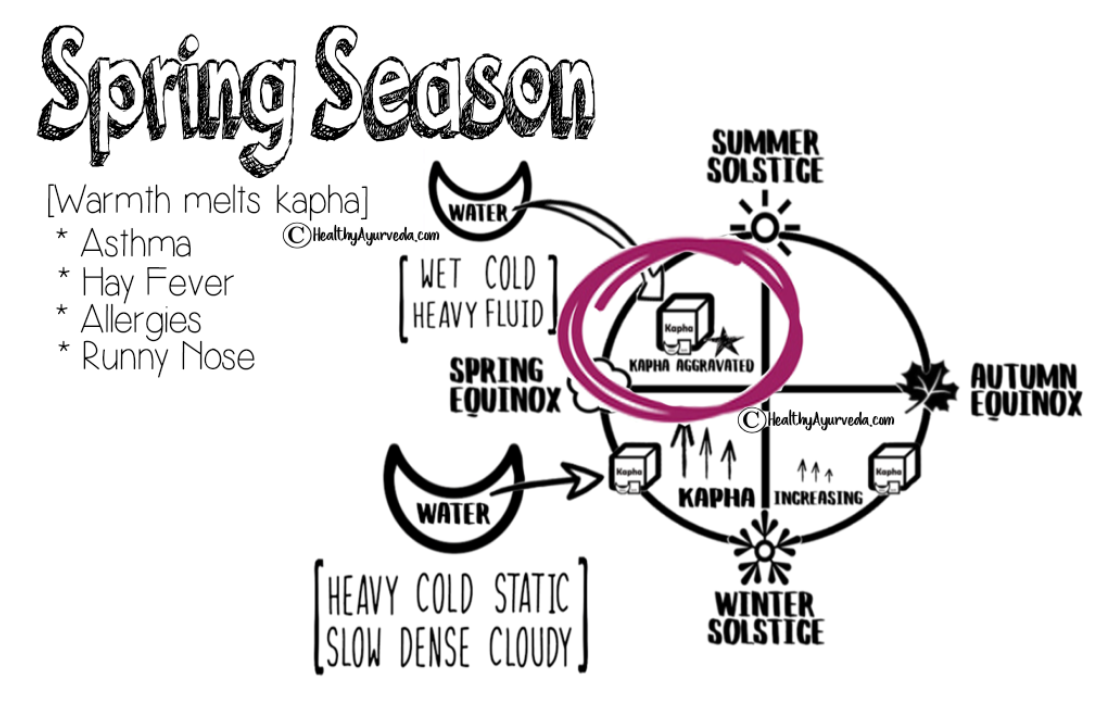
The warmth of spring melts the winter snow which brings about moisture to the atmosphere. Similarly, Ayurveda speaks about the springtime warmth also melting the accumulated cold quality of “kapha dosha” which liquefies and often manifest as “hay fever” [i.e. nasal congestion, itchy and watery eyes, sneezing, postnasal drip, and cough].
Do’s
The goal during spring season is to pacify kapha with foods that are light and easily digestible. Foods that are particularly bitter, pungent, and astringent as these tastes are considered kapha pacifying – or that which helps to reduce kapha.
Organic Kapha Churna Stimulating Spice Mix
Ready-to-use spice mixtures satisfy the six ayurvedic tastes considered essential for balance. Organic Stimulating Kapha Churna includes ginger, coriander and turmeric.
Don’ts
Avoid food which are heavy and oily while minimizing tastes which are sweet, sour and salty – as these flavors increase kapha. Instead, we should consider foods which are pungent, bitter, astringent – since these tastes naturally help to reduce kapha.
Examples Springtime foods – which help pacify kapha
- Legumes: split pea, red lentils, chickpeas, pinto beans
- Grains: amaranth, barley, buckwheat, corn, millet, oats, quinoa, rye
- Fruits: apples, apricots, berries, cherries, mangoes, peaches, pomegranates, pears
- Veggies: artichoke, asparagus, beets, broccoli, carrots, okra, spinach
Click Here: For More Information On Spring Considerations
Also Keep In Mind:
Late Spring … Pitta Begins To Increase
Summer Season …
Ayurveda describes the summer heat as being “pitta-aggravating” which implies provoking the fire element within. It’s intuitive that the basic goal during summer is to stay cool. The foods to favor during summer consist of bitter, astringent, healthy sweet, light and easily digestible foods. One should especially enjoy the great variety of colors of vegetables and fruits such as broccoli, brussel sprouts, kale, cauliflower, turnips, purple potatoes, karela (bitter gourd), cabbage, dandelion, burdock, lettuce, neem, green beans, peas, cucumber, zucchini, yellow squash, apples, pears, sweet berries, ripe mango, peach and watermelon. Prepare the foods with spices such as fennel, coriander, cardamom, cilantro, and coconut. When cooking beets, carrots, tomatoes, pumpkin, okra, spinach, and chard, make sure to include a lot of cooling foods such as coconut, cucumber and cilantro in the menu – especially when living in places where the summer heat is intense.
Click Here: For More Information On Summer Considerations
Pearl Of Wisdom:
During the hot summer season, you may have noticed that your digestion is not as strong. That being the case you may want to consider ghee to help improve digestion and to also help cool the body. “Ghee is a pitta pacifying substance that is useful in summer and bitter ghee (called tikta ghrita) is especially cooling, as it contains a number of bitter herbs, including neem. Ayurvedic literature says that taking 1/2 teaspoon of bitter ghee on an empty stomach on summer mornings will improve digestive functions and control pitta dosha.” – Dr. Vasant Lad, B.A.M.S.
Towards The End Of Summer,
Vata Begins To Increase.

 Autumn Season
Autumn Season
The qualities of autumn depict the element of “air” which can easily be understood by the nature of wind. The wind during this time of year becomes more gusty and naturally tends to dry the body [i.e. dry skin, dry eyes, constipation, etc.]. From an Ayurvedic perspective this season is thought to aggravate “vata”. Vata regulates all movement within the body with a special function of communication. Although the principle of vata permeates the entire body, its main sites of the body mostly include the central nervous system, the colon, skeletal system [hair & teeth] and skin. Therefore, as we prepare for autumn season and while keeping the totality of body-mind in perspective it is also important to take these special attributes of vata into consideration.
Other Seasonal Considerations For Autumn:
– eat warming, soothing, and easily digestible meals
– eat foods which are primarily sweet, sour and salty in taste
– drink warming herbal teas such as ginger, cinnamon and cardamom tea
– keep warm and stay out of strong winds
– do regular yoga, meditation, and pranayama breathing exercises
Click Here: For More Information On Autumn Season
Towards The End Of Autumn & Throughout Winter Kapha Increases.
Winter Season
Winter is a time when nature’s energy withdraws back unto herself as nature’s many expressions begin to slow down. According to Ayurveda, a person is a miniature reflection of nature and winter represents a time for much needed restoration. Every season has certain attributes which may cause aggravation and imbalances of doshas. For example, winter is generally considered a “kapha season”. Therefore, colds and other kapha conditions [i.e. congestion] are more common as the heavy, cold, and cohesive qualities of kapha are predominant.
Generally, the food we eat during winter season should be warming, nourishing, and mildly spicy. Likewise, we should avoid cold food and flavors which are excessively sweet, sour, or salty as these are all considered “kapha provoking” and will therefore further increase congestion.
Breakfast
Warm and nourishing breakfast many consist of a small bowl of porridge, oatmeal, cornmeal, barley soup, or kitchari.
Amrit Kalash Ambrosia
Amrit Kalash in the morning is great to help keep your energy and immunity intact and is especially beneficial during winter season. Amrit Kalash is a traditional ayurvedic formula of 13 herbs that supports the health of mind, brain, and nerves; increases vitality and inner strength; powerful antioxidant — research shows it to be up to 1,000 times more effective than vitamins C and E
Full-spectrum antioxidant: targets mind & nervous system
- 1000x more effective in eliminating free radicals (the root cause of aging) than vitamins C or E1
- powerful food for the brain
- significantly boosts immunity & vitality
- best taken with Amrit Nectar
- vata, pitta, kapha balancing (vpk®)
Tea
About an hour after breakfast, consider sipping on kapha tea which contains ginger, cloves, cardamom, turmeric, saffron, and black pepper – all help to improve digestion and help to eliminate mucus from the body.
Organic Stimulating Tea
The perfect answer when you’re feeling sluggish or heavy — spicy tea
Lunch
Lunch is to be eaten around noon as hunger will naturally occur. Lunch should be nourishing and wholesome such as steamed vegetables, warm soups, bread and delicious ghee. It’s best to avoid meals which are cold as this will impair the digestive fire “agni”. To improve digestion, we can add certain spices such as cinnamon, cloves, and black pepper.
Stimulating Spice Mix
Our ready-to-use spice mixtures satisfy the six ayurvedic tastes considered essential for balance. Organic Stimulating Kapha Churna includes ginger, coriander and turmeric.
Dinner
It’s best to avoid having dinner too late and 5-7pm is often ideal. Again, dinner should be warm and nourishing while avoiding excessive sweet, sour or salty tastes; as these flavors increase kapha dosha.
Dinner Drink
Ayurveda suggest that it may be beneficial to occasionally have a glass of dry and warming wine during the winter season as this will encourage circulation and help to stimulate digestion.
Bedtime
As the winter nights get darker earlier, it’s wise to go to bed earlier. Before heading off to bed you may want to consider a delicious cup of hot spicy milk. Spices such as nutmeg are calming and help to promote sound sleep.
Blissful Sleep
Natural sleep aid for falling asleep faster and enjoying deeper, more refreshing sleep; balances, and nourishes.
Deep Rest
To support sleeping through the night; helps in falling asleep more easily, and in returning to sleep when awakened.
All content included on this website (including, but not limited to, images, photos, graphics and text) is the property of ‘Healthy Ayurveda’ and ‘Vedic Sage’ and as such is protected by US and international copyright and other intellectual property laws.
Disclaimer
The sole purpose of these articles is to provide information about the tradition of ayurveda. This information is not intended for use in the diagnosis, treatment, cure or prevention of any disease. If you have any serious acute or chronic health concern, please consult a trained health professional who can fully assess your needs and address them effectively. If you are seeking the medical advice of a trained ayurvedic expert, call or e-mail us for the number of a physician in your area. Check with your doctor before taking herbs or using essential oils when pregnant or nursing.


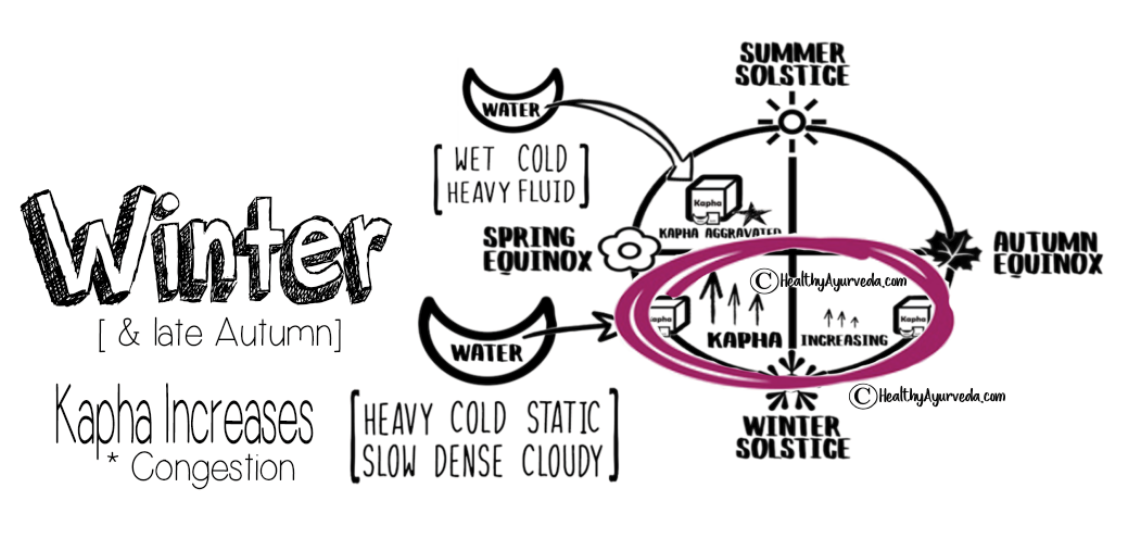
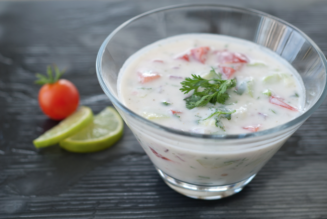
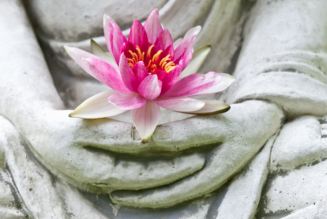
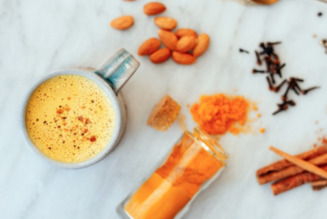
![Female Health: Amenorrhea [cessation of menses] – An Ayurvedic Perspective](https://healthyayurveda.com/wp-content/uploads/2015/07/1.-Amenorhea--327x219.png)

